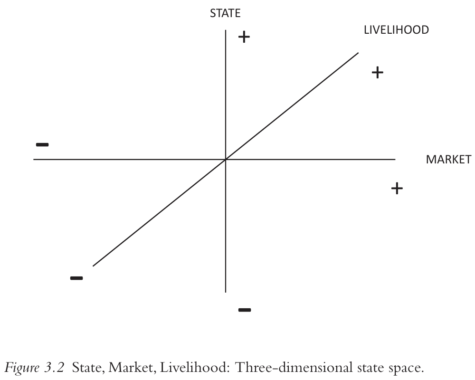The book Ecological Limits to Development: Living with the Sustainable Development Goals, published in 2002 by Routledge, was released as open access in 2023 by Taylor-Francis for readers who don’t have access to a university library.
For the March edition of Systems Thinking Ontario, we were honoured to celebrate the release with editor-coauthors Kaitlin Kish and Stephen Quilley. They were joined by contributing authors Sophia Sanniti and Kathryn Gwiazdon. (There was minor confusion with two Katies/Katys on the call).
In a departure from the usual circle of introductions, we asked participants for a quick check-in via the chat. The introducton to the book started after 3m15s in, with questions-answers beginning after 1h03m.
This recording of the session is available on Youtube, as well as on the Internet Archive .
| Video | H.264 MP4 |
| March 13 (1h42m) |
[20230313_ST-ON EcologicalLimitsToDevelopment_1920x900.m4v] (HDPlus 1920×900 1197kbps 1.04GB) [on the Internet Archive] |
A standalone audio was also created during the meeting.
| Audio | |
| March 13 (1h52m) |
[20230313_ST-ON EcologicalLimitsToDevelopment.m4a] (103 MB) |
Katie Kish started the session by describing the origins of the book, as a discussion between her and her doctoral supervisor. I recognized some of the themes from her 2018 University of Waterloo thesis, Ecological Economic Development Goals: Reincorporating the social sphere in ecological economic theory and practice. Katie unfortunately had to leave the discussion after 1h25m, leaving responses to her coauthors for the last half hour.
Here is the original abstract sent in advance.
This session celebrates the open access release of The Ecological Limits to Development!
Katie Kish and Stephen Quilley critique and reimagine the UN’s Sustainable Development Goals. The existing SDGs are challenged through perspectives of ecological economics and complexity thinking. New goals that align more thoroughly to biophysical limits to growth are suggested.
Ways in which this set of new SDGs could be made usable for Canadian municipalities are also considered.
From the book description …
- Drawing on ideas from H.T. Odum, Herman Daly, Zigmunt Bauman, and many others, this book provides guiding research for a convergence between North and South that is bottom-up, household-centred, and predicated on a re-emerging domain of Livelihood.
Biographies
Kaitlin Kish is President of the Canadian Society for Ecological Economics. She is a research associate for the Footprint Initiative at York University and lecturer of Ecological Economics for the Haida Gwaii Institute at the University of British Columbia. She has a Ph.D. in Social and Ecological Sustainability from the University of Waterloo’s School for Environment, Resources, and Sustainability.
Stephen Quilley is the Associate Director of the Waterloo Institute for Social Innovation and Resilience as well as an associate professor of the School of Environment, Resource and Sustainability in the Department of Environment at the University of Waterloo. Trained in historical sociology and political economy, he has previously held tenured positions at University College Dublin, Ireland, and Keele University in the UK, and a lectureship and a research fellowship at the Moscow School of Economic and Social Science and the University of Manchester.
Additional chapter authors (to be confirmed) have been invited to join in.
Suggested pre-reading
Ecological Limits of Development: Living with the Sustainable Development Goals
- The institutional (library) version from Routledge is at https://www.routledge.com/Ecological-Limits-of-Development-Living-with-the-Sustainable-Development/Kish-Quilley/p/book/9780367540593
- An open access version of the book is at https://www.taylorfrancis.com/books/oa-edit/10.4324/9781003087526/ecological-limits-development-kaitlin-kish-stephen-quilley
- The authors open access version provided by Katie is on Google Drive.
Policy Options to a Radical Recovery | Economics for the Anthropocene is at https://e4a-net.org/newnormal/



